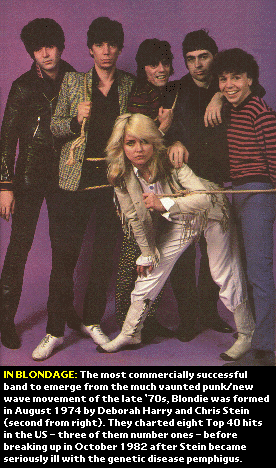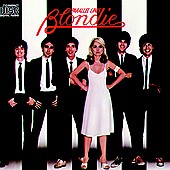|
"Heart of Glass" Blondie Chrysalis 2295 Apr. 1979 Billboard: #1
The single was such a big hit, it even warranted a party thrown by Andy Warhol at Studio 54. It was overwhelming for Harry, who tried unsuccessfully to escape the hordes of photographers who suddenly found her marketable. Guitarist Chris Stein, band co-leader and Harry's lover, told Creem magazine, "We didn't expect the song to be that big. We did it as a novelty item to put more diversity into the album. It's not selling out, it's only one song." "Heart of Glass" and the rest of Parallel Lines were produced by gifted rock graduate Mike Chapman, who had already produced number one hits in America for Exile ("Kiss You All Over") and Nick Gilder ("Hot Child in the City"). A fan of Blondie's first three albums, he felt they could do better. Working with Chapman was very different from what the band was used to. Harry says, "It was diametrically opposite from working with Richard Gottehrer. He's very laid back and Mike is a real hot chili pepper and very energetic and enthusiastic. Mike would strive for the technically impeccable take so we would do take after take whereas Richard always went for the inspired take. Despite its commerciality, "Heart of Glass" provided a problem for radio stations. Many objected to the lines, "Once I had a love and it was a gas/Soon turned out to be a pain in the ass." Stations who preferred not to play the original were provided with a version in which a previous chorus without the offending word was substituted. Harry's reaction to censorship: "I always go along with the idea that any kind of controversy causes excitement and more interest in the long run. That doesn't bother me." Although Blondie had gone through some personnel changes, the line-up on "Heart of Glass" worked together smoothly. Along with Harry, Stein and Harrison were keyboard player Jimmy Destri, drummer Clem Burke and guitarist Frank Infante. Harry and Stein wrote together and separately, with the other members contributing songs as well. Blondie had released several singles prior to "Heart of Glass," including "X Offender" and "In the Flesh" on Private Stock Records, an updating of Randy and the Rainbows' "Denise" retitled "Denis" and "Hanging on the Telephone," the first 45 from Parallel Lines. None of their singles made the Billboard Hot 100 until "Heart of Glass." The band was touring Italy and were in Milan when they found out the record had gone to number one in the States. How did it make Harry feel? "Great! I flipped out. We all got drunk -- it was super." - Fred Bronson, The Billboard Book of Number One Hits, Billboard, 1988.
No comments so far, be the first to comment. |


